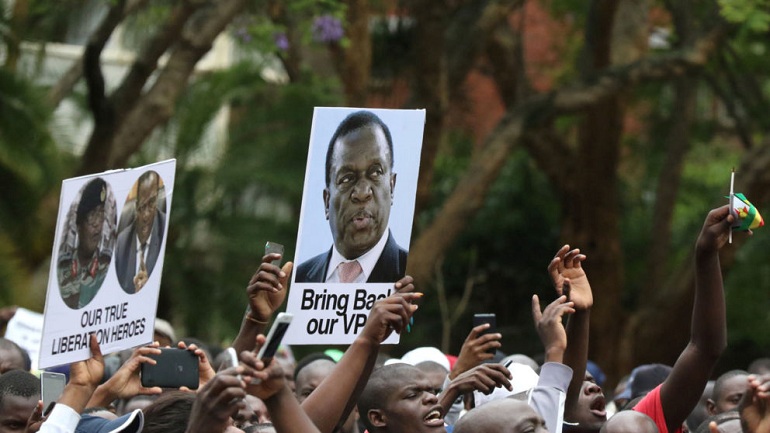There were wild celebrations in the Zimbabwean capital Harare when Robert Mugabe bowed to the inevitable and resigned as President on Tuesday. But as Zimbabweans feted his demise, it was unclear whether they would welcome the man in line to succeed him with such enthusiasm.
So who is Emmerson Dambudzo Mnangagwa, he born on 15 September 1942, in Zvishavane, a mining town in the midlands of what was then Southern Rhodesia, part of the British Empire.
His father was a politically active farmer, steeped in the resistance movement against white farmers. His family relocated to Northern Rhodesia (later Zambia) in 1955. He completed school there before taking a building course from the age of 14. He later transferred to technical college but was expelled for political activism in 1960.
Until Mugabe fired him as vice president earlier this month, Emmerson Mnangagwa’s entire political career had been hitched to Zimbabwe’s 93-year-old former leader.
But Mnangagwa has been eying the presidency and maneuvering to dethrone Mugabe for some time. Sources told CNN that he was instrumental in the military’s apparent coup that led to Mugabe’s political demise.
Mnangagwa is expected to be sworn in as president by Thursday, according to Simon Khaya Moyo, the spokesman for Mugabe’s ZANU-PF party.
Mnangagwa’s dark past made us say he is widely feared and despised throughout the country, and he could be an even more repressive leader than Mugabe if he were to succeed him.
Fear of Mnangagwa stems from his position as Mugabe’s enforcer and head of the Central Intelligence Organization (CIO), or secret police, and his alleged role in the 1983-84 massacres of the Ndebele ethnic group in Matabeleland, a region in Zimbabwe’s southwest that was a centre of political opposition to Mugabe’s regime.
The International Association of Genocide Scholars (IAGS), an international nonpartisan organization, estimate at least 20,000 civilians were killed by the CIO and the armed forces.
“Most of the dead were shot in public executions, often after being forced to dig their own graves in front of their family and fellow villagers,” IAGS said in a 2011 report.
The Atlantic Council, a US-based policy institute, says Mr Mnangagwa was targeted by US sanctions in the early 2000s, for undermining democratic development in Zimbabwe, and he was named in a United Nations investigation into exploitation of mineral resources in Congo.








































admin in: How the Muslim Brotherhood betrayed Saudi Arabia?
Great article with insight ...
https://www.viagrapascherfr.com/achat-sildenafil-pfizer-tarif/ in: Cross-region cooperation between anti-terrorism agencies needed
Hello there, just became aware of your blog through Google, and found ...